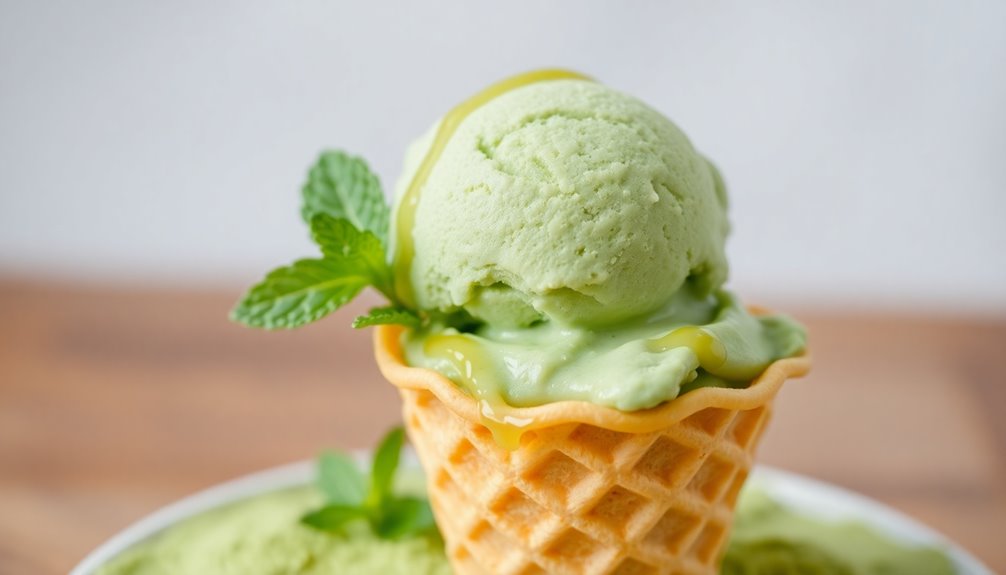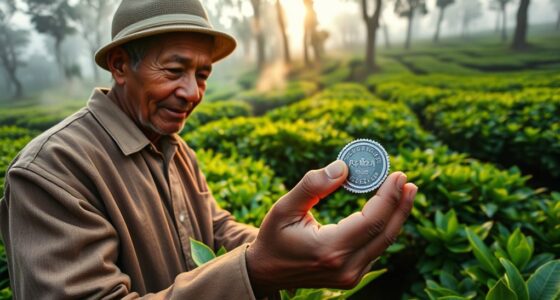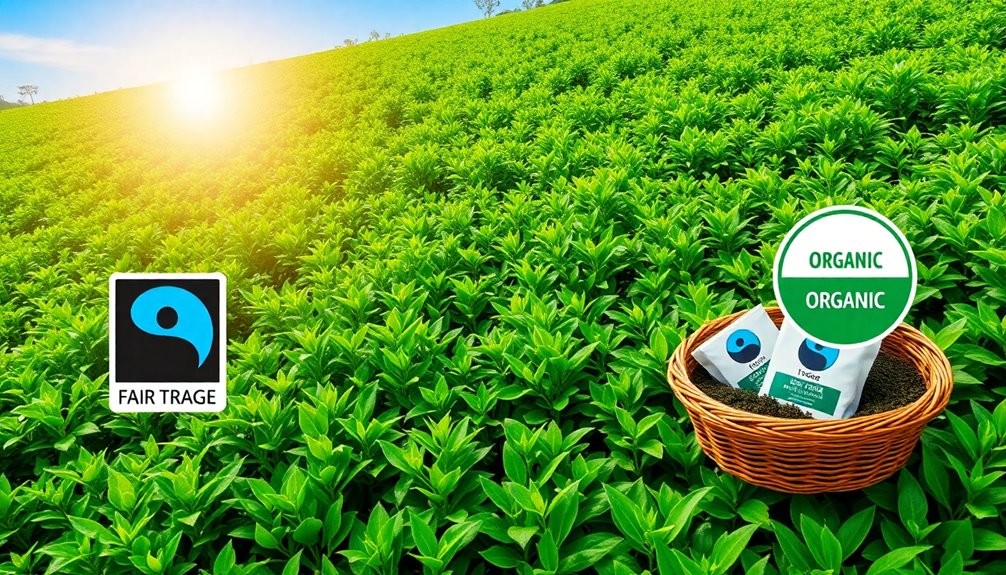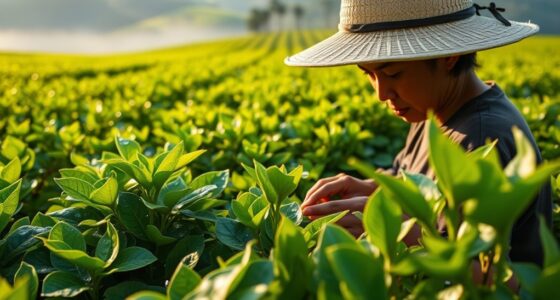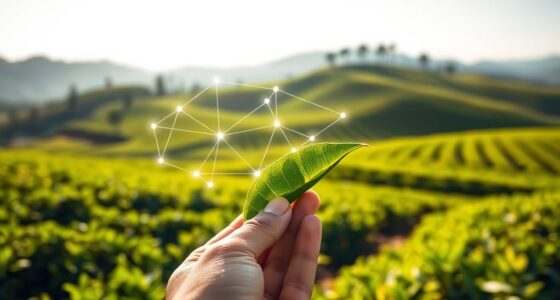Choosing teas that support sustainable farming is easy and fun! Start by looking for teas with certifications like USDA Organic or Fair Trade. These labels mean the tea is grown in ways that are good for the Earth and the farmers. You can also try loose-leaf teas, which cut down on plastic waste. Local teas are a great option too, as they support nearby farmers and reduce transportation pollution. While sustainable teas might cost a bit more, they're worth it for your health and the planet's health. Keep exploring to discover how your tea choices can make a big difference!
Key Takeaways
- Look for certifications like USDA Organic and Fair Trade to ensure ethical and sustainable farming practices.
- Choose loose-leaf teas to minimize plastic waste and environmental impact.
- Support local farmers to reduce transportation emissions and promote biodiversity.
- Opt for brands that use biodegradable or recyclable packaging materials.
- Be prepared to invest a bit more, as sustainable teas often reflect eco-friendly practices and farmer welfare.
Introduction
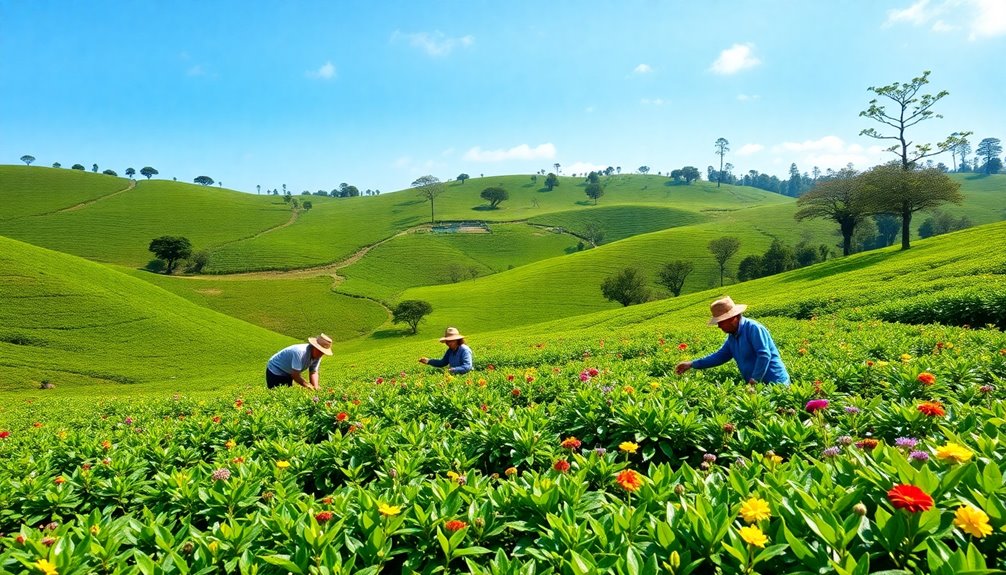
Choosing teas that support sustainable farming is more than just a personal preference; it's a way to contribute to a healthier planet. When you pick teas, look for certifications like USDA Organic or Fair Trade. These labels show that the tea comes from farms that use sustainable farming practices and treat their workers fairly.
Opting for loose-leaf teas instead of bagged ones is another great choice. It helps reduce plastic waste and lowers the environmental impact of packaging. Plus, it often tastes better!
Explore brands that focus on local sourcing. When you choose tea from local farms, you support your community and cut down on transportation emissions.
Don't forget about the materials used for packaging! Brands that use biodegradable or recyclable materials are making a positive difference.
You can also feel good about selecting teas from companies that invest in regenerative agriculture. This practice not only enhances soil health but also promotes biodiversity, helping our planet thrive.
Sustainable Farming Practices Matter
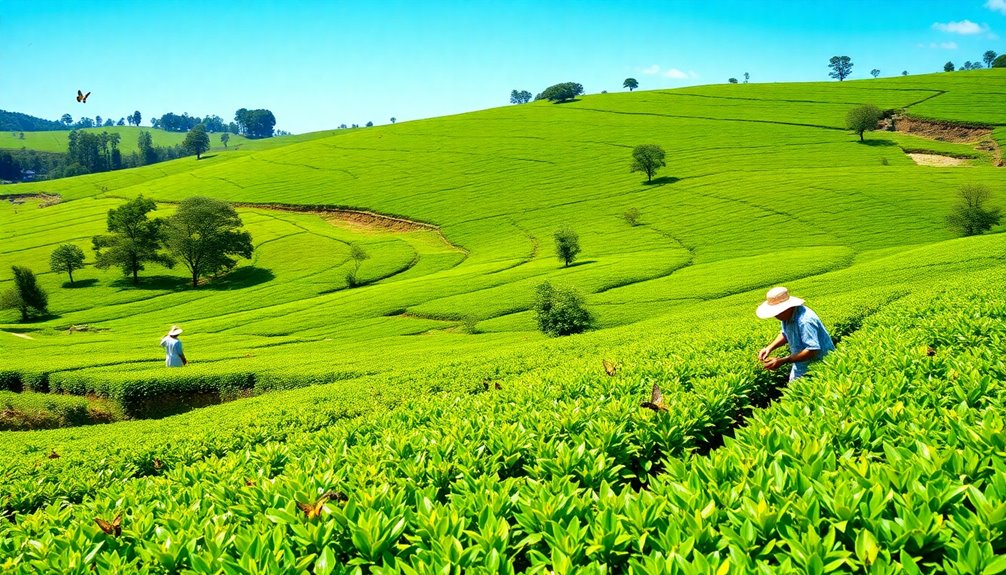
Sustainable farming practices play a crucial role in the tea industry, impacting not just the environment but also the communities involved in cultivation. When you choose tea that's grown using organic farming methods, you're supporting a healthier planet. These methods avoid synthetic pesticides and fertilizers, which means healthier soil and ecosystems.
Plus, they help protect biodiversity, allowing various plants and animals to thrive together. Techniques like permaculture and shade-grown cultivation can make tea farms more resilient to climate change, while also promoting diverse life in these areas.
Implementing regenerative agriculture practices, such as composting and cover cropping, improves soil health and helps sequester carbon emissions. This not only benefits the earth but also lessens climate change impacts. Furthermore, embracing cultural intelligence (CQ) can enhance collaboration between tea farmers and diverse communities, leading to more sustainable practices.
Look for Fair Trade certifications when shopping for tea. They ensure farmers receive fair compensation and work in safe conditions, which supports community welfare.
When you see labels like USDA Organic or Rainforest Alliance, you know the tea was produced in an environmentally friendly way. By choosing these teas, you're making a positive impact on both the environment and the lives of tea farmers.
Organic Certification Standards Vary

When it comes to tea, understanding organic certification standards is key to making informed decisions. You might be surprised to learn that these standards can differ greatly from country to country!
For example, the USDA Organic label in the U.S. has its own specific rules, while the European Union follows a different set of guidelines.
In the UK, the Soil Association has even stricter standards, banning synthetic fertilizers and pesticides in organic farming. This means when you choose teas with their label, you're supporting high environmental sustainability.
Fair Trade certification often overlaps with organic standards, but it focuses more on the social side. It ensures farmers earn fair wages and work in safe conditions.
Then there's the Rainforest Alliance, which not only promotes organic practices but also encourages biodiversity and ecosystem health. Additionally, the growing consumer demand for sustainable products is influencing market trends and prompting producers to adopt better practices.
Local Farmer Partnerships
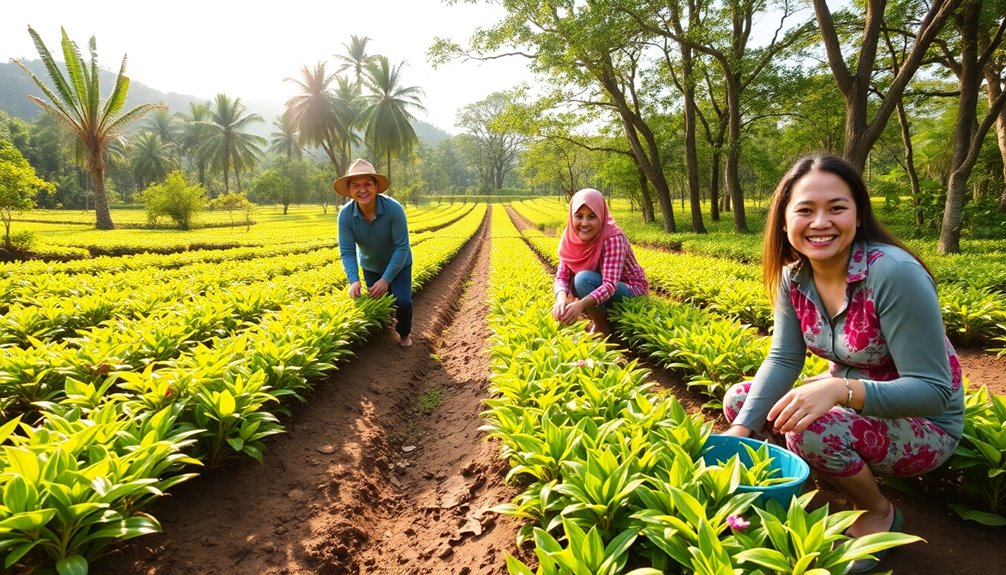
Teas from local farmers not only offer unique flavors but also support sustainable practices that benefit the entire community. By forming local farmer partnerships, you help create a positive impact on the environment and the economy.
When you choose tea sourced from nearby farms, you're reducing the carbon footprint associated with transportation. This means less pollution and fresher tea for you!
These partnerships also ensure that tea growers receive fair wages and work in safe conditions. This contributes to community stability, allowing families to thrive.
Plus, local farmers often promote biodiversity by growing different tea varieties that suit the regional climate. This keeps the land healthy and vibrant!
When you seek out eco-friendly tea, look for brands that highlight their relationships with local farmers or cooperatives.
By doing this, you're not just enjoying a delicious cup of tea; you're also supporting sustainable agricultural practices. This helps preserve resources for future generations and protects the environment from harmful impacts.
Price vs. Sustainability Debate

Navigating the price vs. sustainability debate can be challenging for consumers who want to make environmentally conscious choices without breaking the bank. Sustainable teas often cost more because they come from organic farms that use fair labor practices and eco-friendly production methods.
But here's the exciting part—research shows that 66% of consumers are willing to pay a little extra for eco-friendly options!
When you invest in sustainable teas, you're not just buying a drink. You're supporting regenerative agriculture practices that help the environment by enhancing soil health and biodiversity.
These healthier choices are also free from synthetic chemicals, which is better for your long-term well-being.
Plus, many sustainable tea brands offer bulk purchasing discounts or subscription services, making it easier to choose eco-friendly options regularly.
So while the price vs. sustainability debate might seem tricky, remember that your willingness to invest in sustainable teas can lead to a brighter, greener future.
It's all about finding the balance that works for you and enjoying the delightful flavors of teas that care for our planet!
Practical Applications
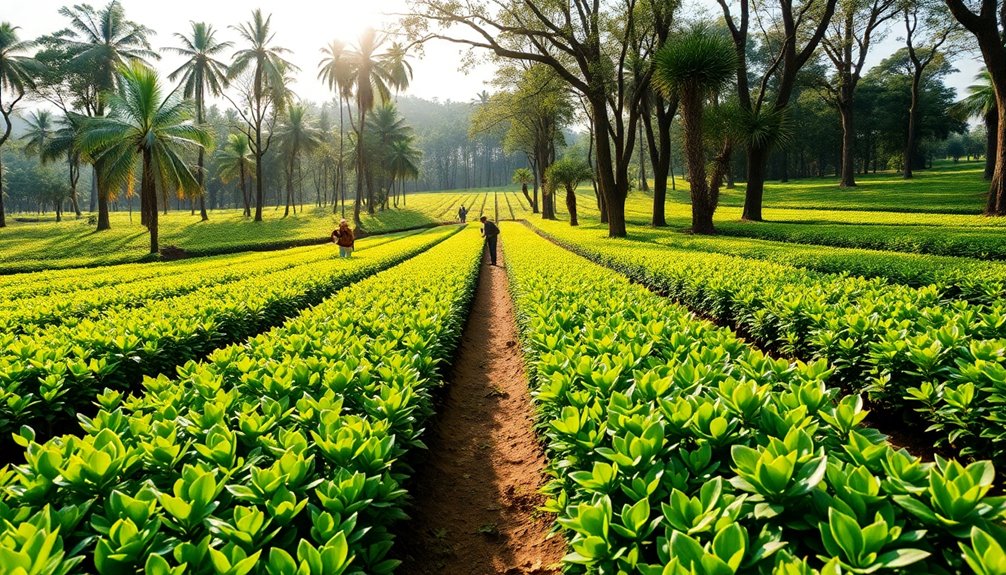
Choosing sustainable teas goes beyond just understanding the price vs. sustainability debate; it also involves practical steps you can take to make a difference.
First, look for certification labels like USDA Organic and Fair Trade. These labels show that the organic tea is grown using sustainable practices and supports fair labor standards.
Opt for loose leaf teas instead of tea bags, as they often have fewer environmental impacts and no microplastics that could end up in your drink.
Next, research tea companies that prioritize sustainable sourcing, such as Hampstead Tea or Revolver Coop Tea. They focus on organic farming and support smallholder farmers.
Additionally, choose teas packaged in biodegradable or recyclable materials. This helps reduce waste and supports environmentally conscious habits.
Frequently Asked Questions
How Can We Make Tea More Sustainable?
You can make tea more sustainable by opting for organic varieties, choosing loose-leaf over bagged, supporting fair trade brands, using eco-friendly packaging, and selecting locally sourced teas to minimize environmental impact and promote healthier ecosystems.
Is Tea Farming Sustainable?
Tea farming can be sustainable, but it often depends on the methods used. By choosing organic practices and supporting certifications like Fair Trade, you help promote healthier ecosystems and protect local communities. It's a collective effort!
Is Loose Leaf Tea More Sustainable?
Yes, loose leaf tea's generally more sustainable. It reduces waste, avoids microplastics, and requires less processing. By choosing it, you're supporting eco-friendly practices and making a healthier choice for both you and the planet.
How Do You Make Tea Bags Sustainable?
To make tea bags sustainable, choose ones made from biodegradable materials, look for eco-friendly certifications, opt for minimal packaging, and consider loose-leaf options. Research brands that prioritize transparency and environmentally responsible sourcing to make informed decisions.
Conclusion
Choosing teas that support sustainable farming is a fun adventure! By selecting organic options, partnering with local farmers, and understanding certification standards, you can make a positive impact. It's exciting to know your choices help our planet. Remember, price doesn't always mean quality or sustainability. So, next time you sip your favorite tea, feel proud knowing you're supporting a healthier Earth. Let's keep exploring and enjoying those delicious, eco-friendly brews together!


